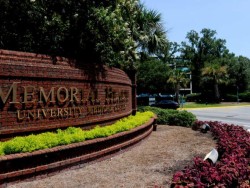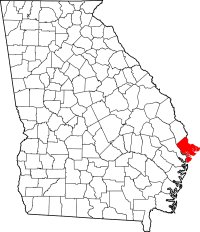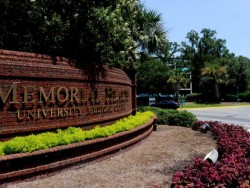The CEO of Memorial Health said Tuesday that the Savannah safety-net hospital system “has to do some regrouping’’ in the wake of Novant Health’s decision to back off a partnership.
North Carolina-based Novant terminated negotiations Monday after months of talks, citing a conflict with the Chatham County Hospital Authority.
In a memo to Memorial Health, Novant CEO Carl Armato said that the hospital authority in the coastal Georgia county “has indicated its intent to go beyond its historical role and has insisted upon inserting itself into the detailed oversight of Memorial operations, potentially resulting in inconsistent direction from two different governing bodies.”

Maggie Gill, Memorial Health’s CEO, told GHN that the hospital authority “kept trying to better the position of themselves and the county’’ in talks with Novant about the hospital lease.
The move creates an unexpected financial void for Memorial. The pending Novant deal would have brought a major financial infusion to the hospital system, which last year lost $22 million.
Other hospital systems could jump in as suitors for Memorial if the Novant talks remain dormant, experts say.
“We’ll regroup and consider what’s out there,’’ Gill told GHN. For-profit hospital systems are likely “to come knocking at the door,’’ she said, but she added that a nonprofit system would be a better fit for Memorial in terms of its safety-net mission.
Gill did not rule out renewed talks with Novant. “I don’t think the memo [from Armato] was an idle threat,’’ she said. For negotiations to resume, the hospital authority would have to back off its position and return to what had already been agreed to, she said.
A fight about oversight
The proposed deal reflected the fast pace of alignments of hospital systems in Georgia and the nation, amid major changes in health care payments.
Piedmont Healthcare and Athens Regional Health System are currently close to finalizing a partnership. WellStar Health System, a Cobb County-based powerhouse, recently acquired Tenet Healthcare’s five former hospitals in Georgia as well as West Georgia Medical Center in LaGrange.
And last week, Columbus Regional Health System announced that it, too, is exploring a potential partnership.

The Novant deal included a $295 million commitment to fund capital projects to add and expand several services at Memorial, including the Children’s Hospital of Savannah; ambulatory care expansion in Pooler; expansion of heart and vascular services; and additional critical care beds.
It also included a commitment to ensure repayment of Memorial’s bond debt and to continue critical service lines, including trauma care and neonatal intensive care, Gill said. “I think this [collapse of the talks] is extremely disappointing for the community.”
Memorial Health’s board had approved the deal recently.
But in his memo, Armato wrote, “It has become clear to us at Novant Health that there is a lack of alignment among the Authority, the Memorial board, and the other local stakeholders. We do not believe the proposed partnership would be successful in such an environment. Under the approach advocated by the Authority, we would lack the flexibility to implement best practices quickly and to meet the demands of the rapidly changing health care landscape.”
WTOC reported that Chatham County Hospital Authority Chairman Don Waters issued a statement saying the authority “is surprised by this unfortunate turn of events.”
“We trusted we were dealing in good faith to resolve the issues and move forward with the Novant deal and had no reason to think this was not progressing. In fact, as recently as 10 days ago, Novant had a lease in hand that reflected the agreement reached with the authority in late April,” Waters said.
“The primary concern of the authority is to retain oversight over Memorial’s safety-net services, primarily its Level One Trauma Center, Level Three NICU [neonatal intensive care unit] and a continued commitment to indigent care and medical education.

“We welcomed the opportunity for Memorial to have a capital partner and a strong management team, but there was simply not enough local oversight in the Memorial board (whose board members would have been subject to the approval of Novant) to assure these safety-net services would be retained,’’ Waters said.
Craig Savage, a North Carolina-based health care consultant, said Tuesday that the break-off of negotiations reflects “the organizational chaos” that has characterized the history of Memorial.
“The demise of the potential agreement likely has nothing to do with what is in the best interests of the citizens of Chatham County, but in who retains control,’’ said Savage, who has done consulting work in Georgia.
He said the hospital authority may have feared its influence would be minimized, or even eliminated, if Novant assumed the hospital lease.
“If the math discussed is anywhere near correct, the authority will now need to find alternative sources for funding nearly $300 million in new capital.”
Memorial Board Chairman Harry Haslam Jr. had warned recently that without a “capital partner,” Memorial would face some tough decisions, including challenges to its balance sheet in the next five years, the Savannah Morning News reported.

The newspaper reported that on April 15, the hospital authority unanimously approved a non-binding letter of intent designed to ensure that the proposed partnership protected safety-net services in a move toward final agreement. That action allowed the authority to send to Novant an outline of amendments to the 40-year lease that would include assurances that key services — including Level One trauma care and neonatal care — would be maintained throughout the term of the lease.
“We’re here to protect this safety net,” Waters said, according to the Morning News. “The lease is what protects the citizens of Chatham County and its nearly half-billion dollars in assets we own.”
Gill said Tuesday that the health system will have to look at reducing unprofitable services, such as trauma care, if a partnership isn’t struck in the future.
Consolidation tied to costs
Hospital consolidation in Georgia and nationally is being driven by economic forces. In the current competitive environment, smaller players are more vulnerable than ever, so systems are expanding and banding together to increase their clout in the marketplace.
Largely because of the Affordable Care Act, health systems in general are dealing with wholesale changes in payments for medical services.

Government and private insurers are increasingly tying reimbursement to quality of care, instead of just paying for the quantity of services delivered. Medicare is seeking to standardize quality of care by paying bonuses to systems that measure up and imposing financial penalties on those that do not.
Getting bigger may help hospital systems cut costs and meet the new demands for improved quality. And bigger hospital systems have more leverage with insurers in negotiations over payments for medical services. In addition, greater size can lower the costs for medical supplies, equipment and even administration.
“Novant and Memorial will have future partnership opportunities, since geographic coverage and economies of scale are imperatives as health care delivery changes rapidly,’’ said Chris Kane, a consultant with DHG Healthcare.
“Novant and Memorial are highly respected health systems, Kane added. “Novant’s aspiration is the continued growth of a multistate health system. The Memorial partnership was a high profile element of this strategy.”
“Access to capital and retention of key clinical services are high priorities for parties evaluating partnerships,’’ he said. “The termination of this proposed partnership underscores the adage ‘health care is local.’ ”

